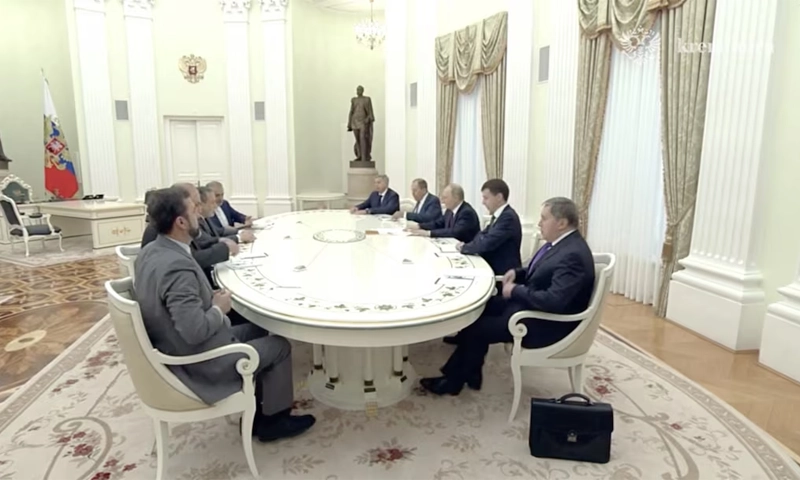- Web
- Feb 20, 2026
Putin tells Araqchi there was no justification for US attack on Iran
-

- Reuters
- Jun 23, 2025

MOSCOW: Russian President Vladimir Putin told Iran’s foreign minister on Monday there was no justification for the US bombing of his country and that Moscow was trying to help the Iranian people.
Separately, the Russian president said that the involvement of powers from outside the Middle East in the conflict with Iran was moving the world towards great danger.
Putin hosted Iranian Foreign Minister Abbas Araqchi in Moscow two days after US President Donald Trump sent US bomber planes to strike Iran’s three main nuclear sites.
“The absolutely unprovoked aggression against Iran has no basis and no justification,” Putin told Araqchi in televised comments.
“For our part, we are making efforts to assist the Iranian people,” he added.
“I am very glad that you are in Moscow today, this will give us the opportunity to discuss all these pressing issues and think together about how we could get out of today’s situation.”
ON THE RIGHT SIDE OF HISTORY
Araqchi told Putin that Iran was conducting legitimate self-defence, and thanked Russia for condemning the US actions. He conveyed best wishes to Putin from Iran’s supreme leader and president.
“Russia is today on the right side of history and international law,” said Araqchi.
It was unclear, however, what Russia might do to support Iran, an important ally with which Putin signed a strategic cooperation treaty in January. That agreement did not include a mutual defence clause.
Before Saturday’s US strikes, Moscow had warned that US military intervention could destabilise the entire region and plunge it into the “abyss”.
Asked what Russia was ready to do to help Tehran, Kremlin spokesman Dmitry Peskov said: “It all depends on what Iran needs”. He said the fact that Moscow had offered to mediate in the crisis was itself a form of support.
Peskov condemned the US attacks.
“An increase in the number of participants in this conflict is happening – or rather, has happened. A new spiral of escalation of tension in the region,” Peskov told reporters.
“And, of course, we condemn this and express regret in this regard, deep regret. In addition, of course, it remains to be seen what happened to (Iran’s) nuclear facilities, whether there is a radiation hazard.”
Peskov said Trump had not told Putin in detail about the planned strikes in advance.
“There was no detailed information. The topic of Iran itself was repeatedly discussed by the presidents during their most recent conversations, certain proposals were voiced by Russia, but there was no direct detailed information about this,” he said.
MORE HELP
In a separate report, Reuters says Iran’s supreme leader sent his foreign minister to Moscow to ask Putin for more help from Russia after the biggest US military action against the Islamic Republic since the 1979 revolution over the weekend.
Trump and Israel have publicly speculated about killing Supreme Leader Ayatollah Ali Khamenei and about regime change, a step Russia fears could further destabilize the Middle East.
Araqchi was quoted by the state TASS news agency as saying that Iran and Russia were coordinating their positions on the current escalation in the Middle East.
Russia, a longstanding ally of Tehran, plays a role in Iran’s nuclear negotiations with the West as a veto-wielding UN Security Council member and signatory to an earlier nuclear deal Trump abandoned during his first term in 2018.
While Moscow has bought weapons from Iran for its war in Ukraine and signed a 20-year strategic partnership deal with Tehran earlier this year, their relationship – which spans centuries – has at times been troubled.
The partnership deal does not contain a mutual defence clause.
SUPPORT IRAN LIKE US BACKING TO UKRAINE
Inside Russia, there were calls for Russia to support Iran in the same way Washington has supported Ukraine – including air defence systems, missiles and satellite intelligence.
At the UN Security Council on Sunday, Russia, China and Pakistan proposed the 15-member body adopt a resolution calling for an immediate and unconditional ceasefire in the Middle East after U.S. strikes.
Russia’s UN Ambassador Vasily Nebenzya recalled former US Secretary of State Colin Powell making the case at the UN Security Council in 2003 that Iraqi President Saddam Hussein constituted an imminent danger to the world because of the country’s stockpiles of chemical and biological weapons.
“Again we’re being asked to believe the US’s fairy tales, to once again inflict suffering on millions of people living in the Middle East. This cements our conviction that history has taught our U.S. colleagues nothing,” he said.




